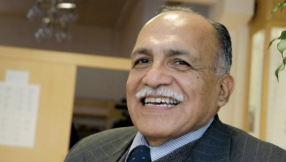Mission is front and centre on the Church's agenda. It is hard to find a growing church these days that is running only for its members. Most churches I come across are seeking to serve the communities they have access to. But I have noticed some competing trends that could tear the Church's mission apart.
People and Programmes
Churches are running programmes such as Foodbanks, Street Pastors, Alpha, Christians Against Poverty (CAP), Mums and Toddlers groups, English Speakers of Other Languages (ESOL) classes, parenting classes and many other creative ways of engaging with their communities. We are increasingly active outside of our circle of friends both in evangelism and in social justice. Here we see integration at work.
Yet there is a disintegrating tendency at work too. In many churches there is a disconnect between the programmes and the congregation. This works at two levels. Firstly, fewer church members are now available to help run these events as more people work full time, so programmes are often run by paid staff. Secondly, those people who attended the ESOL classes or financial support groups rarely turn up to our services. If they did would we even know what to do with them? And so for all our programmes there is still the challenge of relational integration.
Church leaders often feel the pressure of providing the kind of church experience that is expected by those who faithfully attend, and financially support, their churches. Our regular punters want excellent children's ministry, high quality music, and engaging biblical preaching. But our visiting community members may have different criteria. Some churches solve the 'problem' by running alternative services for those who come from difficult backgrounds. Other churches have worked hard at integration although it's messy and complicated and it doesn't plot well on a church growth chart. Building relational bridges between the congregation and the community can be difficult. Many people commute to church and so have very little relational connection to the neighbourhood where the church is. Some people are busy at work and prefer to give money instead of time to help the needy – and they really don't expect to have much to do with them apart from that.
Stephen Whittington, a church pastor in Hull, raised the question at a recent Jubilee Plus conference: "Are we running a church for the poor or are we just running church projects?" Sadly, the two often don't overlap.
Gospel and Justice
Despite many of our churches being active in evangelism and engaging with poverty, the connection between poverty and our gospel is often tenuous. Justice is often not theologically attached to the core of our message. In fact, it is so tangentially connected that some churches sever it completely. Many Christians still argue that social justice is a distraction from gospel ministry. They point to examples of mission agencies and indeed churches that have shown an interest in social justice and have ended up theologically liberal or uninterested in evangelism. They point out that involvement in social justice ministry is a softer option because our culture will cheer us on, while the important work of evangelism is declining as our culture is increasingly nervous of the idea of conversion. These conservative Christians raise a fair point, even if it reveals a skewed understanding of the gospel.

Think about the last evangelistic talk or course you were part of – was caring for the poor part of the message? Caring for the poor has become such an optional extra that I can't think of the last time I saw it included in the curriculum of an evangelistic course or as part of an evangelistic presentation. Yet Jesus spent the bulk of his time with the poor: he preached good news to them, and challenged his followers to care for them.
So who are we to separate what God has joined together? Caring for the needy and vulnerable is an essential part of Christian devotion. We cannot divorce the good news of the gospel from the good works of the Kingdom – either because of fear of the culture or due to a misreading of Scripture. As long as our gospel remains incomplete our discipleship will remain incomplete too. We need to look again to Jesus who preached and lived a body and soul gospel, where people always won over projects.
Now and Then
Most churches I know use either Alpha or Christianity Explored as their central evangelistic tool. Both have recently invested a lot of money in upgrading their videos, and both work on a similar premise: the gospel is best communicated through a drip feed of the Bible, stories and the opportunity to ask questions. They both offer a community-based dialogical and relational approach to evangelism. Both have been very successful. Both have begun to internationalise. Both work on the premise that Christians have a circle of friends who may be interested in Christianity and through a relational bridge can be invited to explore the faith further. Both emphasise what we could call a 'process approach' to evangelism – a gradual introduction to the Christian faith.

Over the past couple of years we have seen alternative approaches to evangelism. The healing on the streets phenomenon encouraged people to go out in their neighbourhoods and find people to pray for. There is currently an approach to evangelism taking place on the streets of Reading, Liverpool and Southampton where Christians are encouraged to approach strangers and ask them a series of questions which leads to a presentation of the gospel. Participants report hundreds of people converting, and some are using the word revival to account for what has happened.
From what I can understand, this approach to evangelism has seen more fruit when done with strangers than with family members and work colleagues. Indeed, the less relationship present the more effective the approach seems to be. No practical help is offered, no needs are being met, except that of their eternal destiny. This is as far from the process approach as is possible – we could call it a crisis approach to evangelism.
How are we supposed to understand this disintegration in mission between the crisis and the process while praising the integration of evangelism back into our mainline ministries? What is our stand on the dichotomy between the faithful presence in the community verses the immediate conversion of strangers? Surely our gospel needs to account for both.
Jesus talked about an invisible slow and steady growth of the Kingdom, like a mustard seed or yeast working through dough. Yet he also demonstrated transformative encounters with strangers and outcasts. We need the reintegration of crisis and process, but also to recognise that we cannot allow the crisis approach to evangelism to act as a short-circuit to the long-term relational investment that authenticates our gospel witness. We cannot allow for the process and crisis to fall apart.
Programmes and Commitment
Volunteering once a fortnight on a rota to help the poor is praiseworthy. It is more than many people do. It may be enough to open our eyes to the great needs of our communities, and inspire us to act and advocate on behalf of the vulnerable. However, a rota slot should not be confused with a life of service. We need to give people onramps to engage with poverty and injustice but we need to be careful not to confuse the onramps for the thing itself. It's like confusing the wedding for a marriage: it's an important rite of passage, but it's not the whole journey. What we do in church services or on Friday nights is important but should not be confused with true worship of God. Short-term mission should not be confused with the mission of the Church.
As a cross-cultural missionary, I was often shocked by the sanctuaries we made of our own homes. While we worked with families who were crowded into small, basic apartments, we would go home to what would seem to be our relocated American or British residences with all their mod cons. Outside the home we would be missionaries, not afraid to get our hands dirty. But then we would come home to recharge and would lock the doors behind us. I was also shocked when we occasionally saw the opposite approach: a missionary who was prepared to live like and with the people they were reaching. This integrated approach inevitably reaped much more fruit.
Mission is ontology. It's a way of being in the world – not a temporary activity we engage in. It's more than a programme, more than a hobby, more than something we do with a segment of our lives. It's a permanent posture towards our world and our God. Jesus is the Son sent into the world to serve the Father all the time. Like a stick of rock, Christ is mission all the way through – wherever you cut him he bleeds the compassion and grace of God. So must we, as living sacrifices. We need to live out our commitment to the people we are reaching out to, above our commitment to the projects themselves.
We still celebrate the instant over the long-term, the miraculous over the mundane, the crisis over the process, the body over the soul, at our peril. We need a gospel that is big enough to cope with the complexity of life in order to live lives of faithfulness to our God.
Dr Krish Kandiah is a theologian, author and the founding director of Home for Good, a charity seeking to find loving homes for children in the care system. Follow him on Twitter @krishk.













